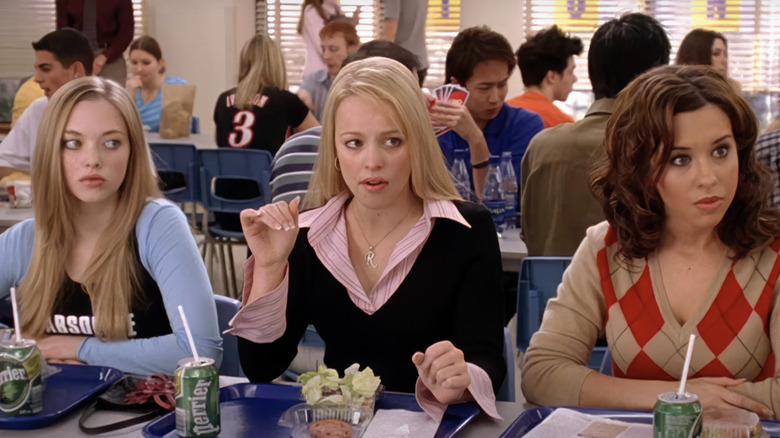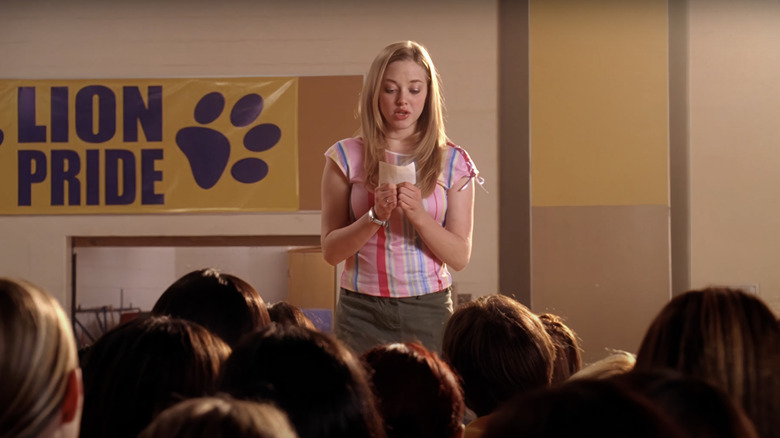Mean Girls: What Parents Need To Know Before Letting Their Kids Watch
"Mean Girls" is one of the most important films from the 2000s and continues to be widely referenced to this day. Because of its cultural impact, it's no surprise that children and teenagers might want to watch the 2004 teen comedy. Directed by Mark Waters and penned by Tina Fey (who also has a starring role in the picture), "Mean Girls" follows the inner happenings of a typical American high school, where drama, cliques, and gossip rule the hallways. In "Mean Girls," the formerly homeschooled Cady (Lindsay Lohan) finds herself dabbling with the Plastics, a clique of popular mean girls. Led by the iconic Regina George (Rachel McAdams), Cady infiltrates the Plastics, trying to change her toxic high school environment from within.
Filled with hilarious commentary on teen culture, "Mean Girls" immediately struck a chord with audiences for satirizing the educational experience. While the film is still relevant nearly two decades after its release, "Mean Girls" isn't the best film for young audiences to watch. Common Sense Media, an outlet that helps parents and guardians make informed decisions about the content their children watch, says the film is best suited for those who are 14 and older. This lines up with the PG-13 rating the MPAA (Motion Picture Association of America) awarded the film.
"Mean Girls" is riddled with mature content and subject matter and features frequent profanity, including one instance of the F word. The film also has its teen cast say inappropriate and insensitive slurs and terms, albeit for comedic effect. In addition to depicting underage drinking, "Mean Girls" also features suggestive sexual content.
Mean Girls is a mature but relevant film
Ultimately, it's up to parents and guardians to decide if "Mean Girls" is appropriate for their children. Adults need to know that the film features several instances of underage drinking, insensitive slurs, and forms of name-calling, as well as sexual references, including an acknowledgment of statutory rape. The film does skirt past some heavy subject matter and mostly uses its mature and suggestive content to make audiences laugh.
While there are aspects of the film that parents and guardians may find inappropriate, it's important to note that the film does feature positive themes and implores its young viewers to examine their biases and renounce any sort of cliquish, exclusionary behavior. In "Mean Girls," Cady finds herself realizing just how powerful and dangerous gossip and manipulation can be, especially in a high school setting. In 2015, Teen Vogue writer Madonna Matta discussed the various life lessons that teens could learn from the film, with one lesson being: "Rumors aren't fun; and the truth always comes out eventually."
Seeing as "Mean Girls" is relevant to this day, it's important for parents and guardians to acknowledge that the film isn't just a movie, but rather a cultural fixture that is actively referenced. For today's teenagers, "Mean Girls" is a must-watch that not only helps them connect with contemporary pop culture, but also allows them an outlet to explore taboo high school topics.
If you or anyone you know has been a victim of sexual assault, help is available. Visit the Rape, Abuse & Incest National Network website or contact RAINN's National Helpline at 1-800-656-HOPE (4673).
Mean Girls has its heart in the right place
"Mean Girls" is based on "Queen Bees and Wannabes" by Rosalind Wiseman, a text that helps parents and guardians guide their teenagers through the complex world of high school. The book inspired Tina Fey, the writer behind "Mean Girls." In writing the picture, Fey drew upon her own high school experiences, examining some of her own behavior. "I revisited high school behaviors of my own—futile, poisonous, bitter behaviors that served no purpose," Fey told The New York Times for the film's 10th anniversary.
For Lacey Chabert, who plays Gretchen Wieners in the picture, working on "Mean Girls" was relatable, as it reminded her of the toxicity and chaos that was ever-present in her teen days. "I related to the part in the movie where girls are cutting themselves down, like, 'My hairline is weird'—stuff people would never notice on someone else," Chabert told The Times in the same retrospective interview.
Perhaps what's most interesting is how Fey acknowledges that discovering the film is now a key milestone in a female-identifying teenager's life. "It has this little net that catches girls as they pass through preteen and high school age," Fey said. "Girls will come up to me and say it helped them get through a terrible year." Yes, "Mean Girls" is crude, profanity-heavy, and filled with sexual subject matter which may make it worrisome for parents and guardians. Ultimately, however, it's a realistic depiction of high school with a positive message about inclusion.


